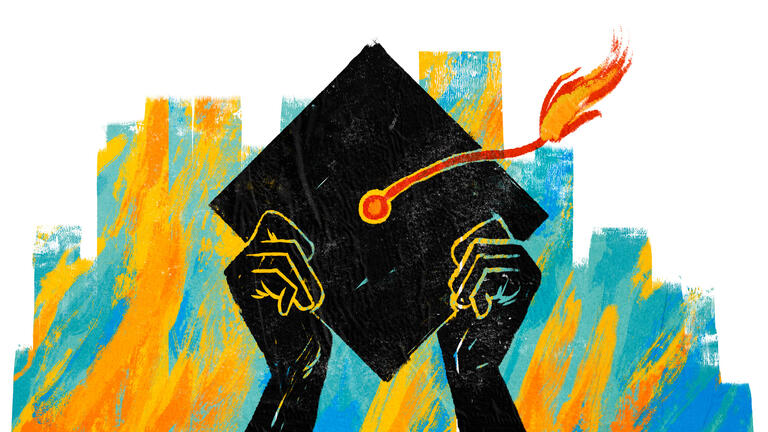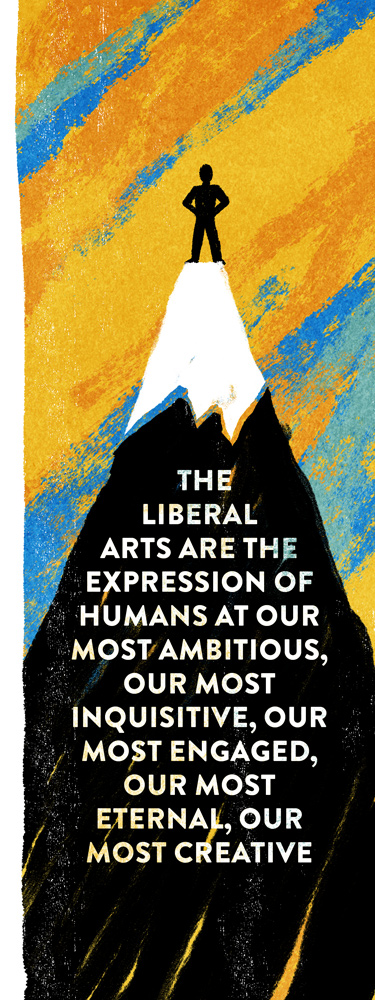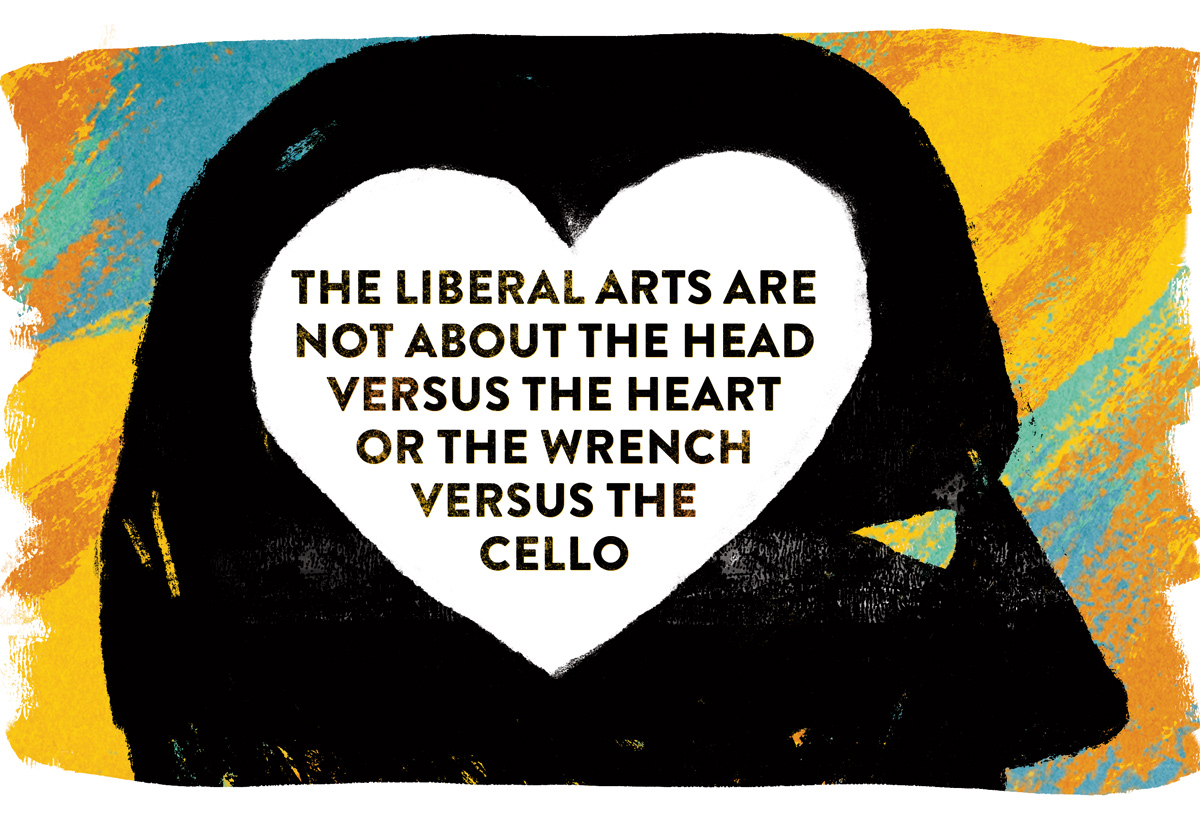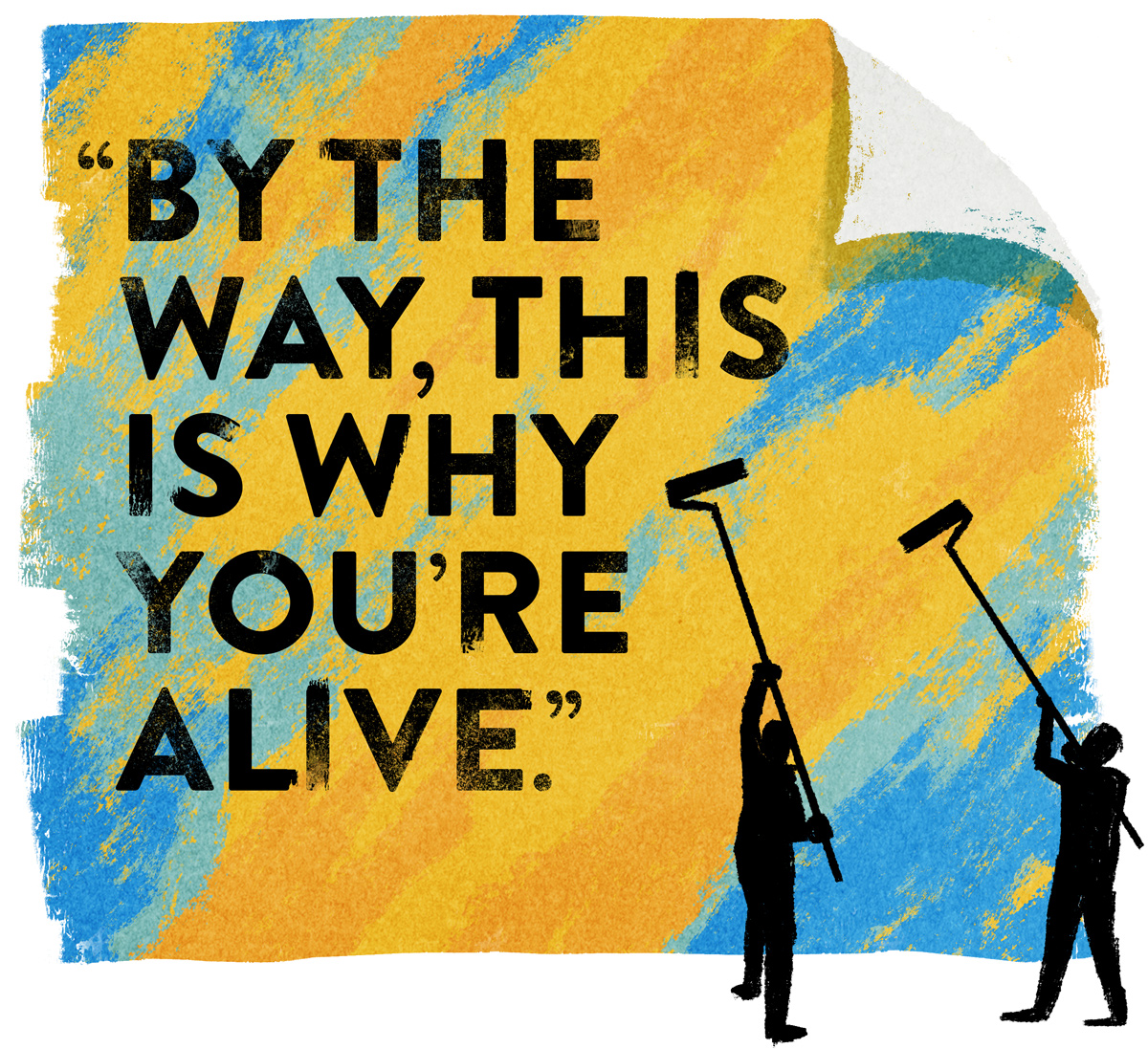
The Case for Liberal Arts
I am writing this sentence a little over 24 hours into San Francisco’s shelter-in-place order. I can’t remember a time in my life when there was more confusion about what we know and what we don’t know.
What we appear to know right now is that, globally, around 9,000 people have died from COVID-19 and roughly 200,000 people are infected. We know we are in a pandemic. We know we need each other; we know we must stay away from each other. What we don’t know is how bad things will get, how long countries will be locked down, and how humans are going to act and react as fear, isolation, incredulity, panic — and the degree to which unending data, both accurate and speculative — overwhelm us. We know we are killing each other with the very bodily functions that keep us alive.
When I began this essay in the early days of 2020, the world looked different. The fires in Australia had burned more than 63,000 acres. The president of the United States made a unilateral decision to kill the Iranian general Qassem Suleimani, and Iran launched an attack on a U.S. military base in Iraq. The president had been impeached by the U.S. House of Representatives, and his trial was about to begin in the Senate. There had already been 277 gun-related deaths in the United States. And, The New York Times reported that from 2007 to 2017, depression among Americans ages 10 to 24 rose 65 percent, and suicides among the same group jumped 56 percent. Things looked grim, but I was in residence at the MacDowell Colony in Peterborough, New Hampshire, with 20 other writers, painters, composers, and performers. The base code of MacDowell is the liberal arts. We were all processing what was happening; sometimes in our work, sometimes in our conversations. But, we could have breakfast and dinner around the same table without infecting each other with anything but ideas.
What I want to say about the liberal arts must be said in context. Those concerns from the previous paragraph have not gone away — global warming, gun deaths, military violence, suicide still exist and could even be worsening as the pandemic accelerates. Who knows what will happen between the time I wrote my first paragraph above and the time you read this one, but however you or I try to make sense of this world, how we respond will have been informed, in various ways, by the values of the liberal arts.
This is the point in the essay where you probably expect me to transition to a new, more conventionally practical topic, in which I argue that majoring in the liberal arts is a good strategy for entering the job market, especially now, as we appear to be on the brink of a global recession. However, this is not an essay about jobs. This is an essay about life. Or at least about living.
Liberal arts students do get jobs when they graduate from college. English majors from USF have gone on to successful careers in technology, academia, publishing, the law, public service, and even sustainable farming. Shelly Lindgren ’01 is an award-winning sommelier. Katie Manderfield ’07 is the global executive editor and creative director of Bloomberg Media. Andrew DeFrancis ’02 worked as legal counsel for Walt Disney. Michelle Cancillier ’13 works at YouTube in creator and artist development.
Yes, a job helps make a living, but it is not living. Real living is about joining the discourse of your era, dealing with contradiction, living in gray areas, taking care of the planet, making sense of death, and, most importantly, finding one’s purpose. As we move forward from the pandemic, our old notion of “work” or “job” might be altered radically. We may be asking larger questions about both our vocations and our avocations. These questions are the purview of the liberal arts.

One of the many things a liberal arts background gives human beings is an attention to language and in particular a belief that words have meaning and history. Consider “university.” It comes from the Latin universitas, from which we get the word “universe,” meaning “the whole, the entire number, the sum of things.” Thus, a university, a real one, is not only supposed to help students pursue a particular skill or field; it is designed to orient us toward the entire, toward the greater good, toward what the Jesuits call magis. And consider the word “school,” which derives from the Latin schola, which comes from the Greek σχολή (schole) meaning “intermission from work, leisure for learning.” This notion of leisure is not to be confused with laziness. Leisure comes to us from the Latin licēre, which means “to be permitted,” not unlike liberal, which means “free, open, unconstrained.”
True intellectual leisure is the freedom to think about anything, to ask big questions, to let yourself be taken to places your imagination wants to venture. The liberal arts, then, put us in touch with moments when our hearts and heads are aligned in moments of clarity and courage. The liberal arts are the expression of humans at our most ambitious, our most inquisitive, our most engaged, our most eternal, our most creative.
Last fall, I taught Introduction to Writing Poetry. The poems produced by the students were some of the most mature, thoughtful, creative pieces I’ve ever read by undergraduates. They made observations about gender, race, biculturalism, God, sexuality, belief, and love, and did so in such formally inventive ways that I found myself inspired by their eagerness not to be confined.
Last October, I was invited to participate in a “space camp” think tank at the University of Kentucky. We discussed what humanity will need in order to remain human and spiritual once we start living in space or on other planets. The group consisted of roughly 30 smart people, from a variety of fields. There were of course NASA scientists and trainers of astronauts, but there were just as many folks from the liberal arts: a philosopher, an artist, an architect, someone from the world of theater, a space anthropologist, and me — a poet. Why a poet? In the science fiction novel Contact, Ellie Arroway (played by Jodie Foster in the film) is asked to talk about what space was like. She responds, “No words to describe it. Poetry! They should have sent a poet.”
During our discussions, there was some talk of technical issues, but most of the conversation centered around humanistic concerns. How would we relate to each other? What mistakes should we not make next time around? Is it possible to settle a new place and not participate in a violent colonial enterprise? I talked about how we would need people to tell stories for the comfort that stories supply, because there would likely be a harrowing sense of what the poet Rainer Maria Rilke called “un-at-homeness.” So, as much as I appreciate Ellie’s quote, I believe it takes the whole of the liberal arts to make a culture, a system of belief, a home. Thus, I’m more persuaded by Apollo 11 astronaut Michael Collins, who doubles down on humanists in space. The crew for a future Apollo mission, he said, “should include a poet, a priest, and a philosopher.”
In his book Economy and Society, the German sociologist and philosopher Max Weber made a distinction between two types of actions he labeled “instrumentally rational” and “value rational.” When we do something instrumentally rational, we do it because it’s useful or because it gets us something. When we do something value rational, we do it simply because it’s enjoyable.
Much of today’s writing about the struggles of the liberal arts — the increased “corporatization” of universities, the rise of online and vocational training, the devaluing of humanistic and artistic endeavors — posits that the liberal arts suffer because of our culture’s preference for instrumental rationality over value rationality. That is, if college is a mere prerequisite for employment, then why not go to the least expensive or least challenging institution? And why not study accounting instead of philosophy? There is no doubt this instrumental sentiment is out there, and perhaps growing both domestically and internationally. However, we have to change the script.
It is up to us in the liberal arts and those of us educated at liberal arts institutions to be smarter about how we talk about what we do. The liberal arts are not about instrumentally rational actions versus value rational actions. They are not about the head versus the heart or the wrench versus the cello. They are not about either/or thinking, so neither should be conversations about the liberal arts.

We need the content and the process of the liberal arts because they are important to experience, and also because they help us with the most critical aspects of our lives — decoding the news, communicating with our children, helping to fix gender inequity, making judgment calls with relationships, teasing out our country’s (and our world’s) history of racial violence, figuring out who to vote for, listening to and helping our romantic partners, handling grief, naming moments of sacred connection, thinking about real strategies for maintaining our planet, opening up oneself to the divine, finding in life’s darkest moments the vision and the language that might give meaning to our struggles.
In the 48 hours after the 2016 presidential election, the Academy of American Poets saw more visits to their website, Poets.org, than in any previous 48-hour period. In my Poetry Studio class at USF, we had been preparing for this day, though we all predicted a different outcome. The students had been reading and writing political poems, and I had been talking about how participating in the democratic process is akin to writing poetry — you are putting yourself out into the world and making a statement with all of your head and all of your heart.
When I arrived to class on that Thursday, the students slumped in their chairs. On a whim, I pulled up my Twitter feed and projected it onto the large screen at the front of the classroom. Every tweet seemed to be someone linking to a poem or someone posting a snapshot of a poem. Often, the poems would be accompanied by introductions like, “The only way I’m getting through this day is by reading this Mary Oliver poem.” We had entered a moment when politicians were using language at its worst, and I wanted to point my students to poetry, which is language at its best.
That day seemed to have been particularly useful for this one student, Moyo. Moyo was a business major. His parents had emigrated from Africa, and I think the various poets we read helped him think through his anxiety about the uncertainty of what this new administration might mean for him and his family. By the end of the semester, he was using his poetry to make connections between his past, his future, his sense of purpose, and his sense of self. He also became more precise with how he talked about his own ambitions. I got the sense that the class was instrumental for him spiritually, culturally, and professionally.
Poetry works in mysterious ways.
Not long after my father died in late 2017, I made a pilgrimage to New York to a massive retrospective of drawings by the American artist Cy Twombly. I have been mildly obsessed with Twombly for around 20 years, and I wanted to see what a life devoted to art looked and felt like. I found in those drawings what I have come to think of as a beautiful mourning. Somehow, in some way, looking at those drawings, many of which also had lines of poetry scrawled on them, helped me deal with my father’s death like nothing else. In Twombly’s drawings in which lines and circles and scribbles share the page with scrawled lines of poetry, I saw a big mind trying to come to terms with meaning, life, death, the weight of history, and the ability of art to put us in touch with that which is beyond articulation. That day changed the direction of my life.
The writer Teju Cole says of such experiences, “These moments of pleasure, of epiphany, of focus, of being there, in their instantaneous way can actually feel like a little nudge that’s telling you, ‘By the way, this is why you’re alive. And this is not going to last, but never mind that for now.’”
I don’t know why, exactly, I’m here or why you are here or why my sons are here. But that I can write that sentence, and that you can read it, might be reason enough.
Since the outbreak of coronavirus, I’ve been re-reading the work of Rainer Maria Rilke. I’m reading the news, of course, but the anchors of this world need to be lifted now and again so that the ship of the self can spread its sails. In the Duino Elegies, begun in 1912, before World War I and the Spanish flu, and completed in 1922, Rilke lays out that the meaning of life is not only to live but to live in the world, or as he put it, “to rise again into pure relation.” For Rilke, it is this world, not the next one, that needs us. Being here requires everything we have, everything we know, everything we are. We endure through our participation in the earthly.
This is the case in 2020 as much as it was in 1912 or 1922. This is the case after — not just during — a crisis. Our job, our work on this planet is to contribute, to relate. As we move through periods of intense transformation, we will need powerful ideas. We will need bold vision. We will need language to be precise and unveiling. Right now, we need cautious belief. We need beauty. We need the immediate and the eternal. We need everything the liberal arts have given us and everything they will.

Dean Rader is a professor of English at the University of San Francisco. He is an author and widely published poet and was awarded a Guggenheim Fellowship for 2019.